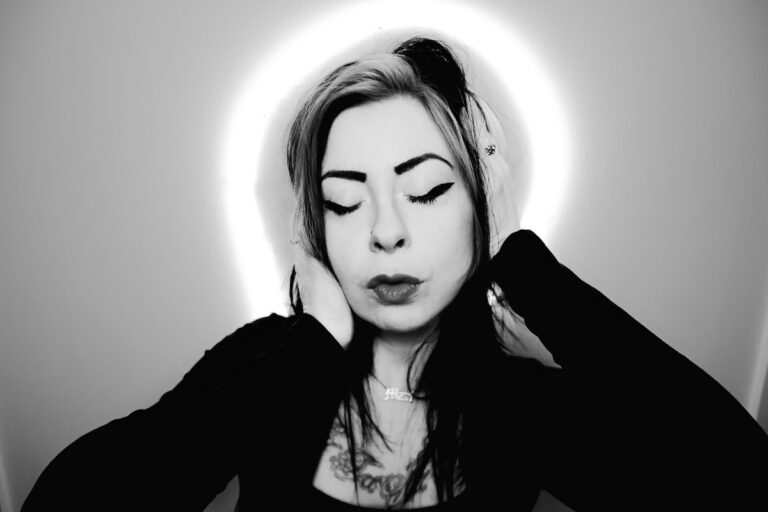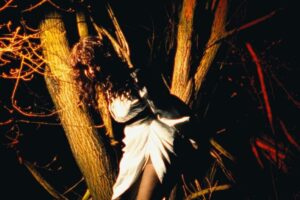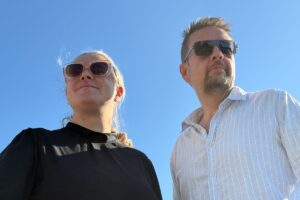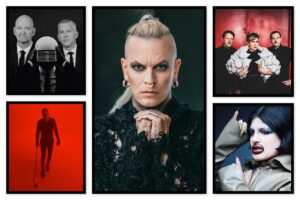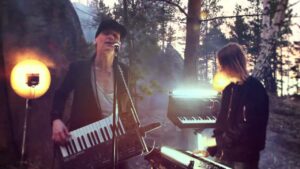Mari Kattman has long been a commanding force in dark electronic music. She’s contributed vocals to everyone from Mesh to Mephisto Walz, released a pair of solo albums made with former collaborators, and formed the synthpop duo Helix with her husband Tom Shear.
This month, she returns with Year of the Katt—a new solo record that finds Mari taking total control.
Out June 20 via Metropolis Records, Year of the Katt marks a turning point. Mari handles every aspect of the album herself, from songwriting to production. The result is a confident, hard-earned statement that fuses the genres she loves into something uniquely her own.
I reached out to Mari to talk about the new album, her creative evolution, and the challenges women face in the scene.
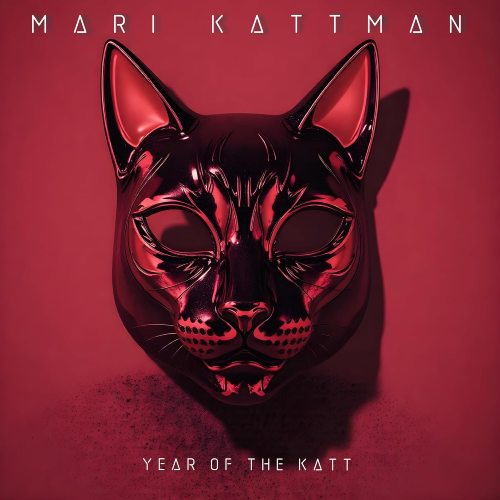
First off, love the title of your new album. Year of the Katt feels like a celebration. What does it mean to you?
It is certainly a celebration! I have been writing and producing my own music now for five years and have just now finished my first full length album entirely on my own. I am incredibly proud of this work and how much growing and learning I’ve done over the last five years to become the musician that I—never in my wildest dreams—believed I could be.
This is the first time you’ve handled everything on the album yourself. What’s been the most challenging—and the most rewarding—parts of that creative process?
I’ve been writing everything on my own since my first EP “drink.” That’s what the Mari Kattman project was—a doorway to doing it all myself. Honestly, if you follow my work from then up until now it truly chronicles the growth of an artist from crawling to walking. I am so excited that I stuck with it long enough, through all the frustration and self-doubt to get to this place.
The most challenging part is certainly the self-doubt and the mental place you get stuck in sometimes with songs that make you think they aren’t good enough.
The most rewarding parts are when you emerge from those holes and receive the inspiration that revives you and keeps you going until the end.
I’ve been following your music for a while, and your most recent songs feel like your strongest work yet. I’m curious what led to that. Is it a matter of confidence, a new skill set, just more time—or something else?
It’s definitely all of the above. I’ve gotten more savvy about production techniques, which truly can make or break a song. I have a better understanding of instrument placement in the mix and how to create depth and space that you can sense with your ears.
Good music is all about dynamics, knowing when to hold back and when to give it up to the audience. That is something that I’ve been very keen to get good at and I think I am confident enough to say that I have a grip on it now.
You’ve collaborated with so many artists over the years. What’s something you’ve learned from working with another artist that’s now showing up in your solo work?
I always say that I can tell what a musician’s strengths and weaknesses are as soon as I hear a track, and that is from the fact that I have collaborated so much with so many different artists over the years. I think it all was good practice on how I wanted and didn’t want my sound to be. I think also being perceptive on how people structure their songs can shine a new light on how you may like to do so in the future.
Most importantly, from a vocal stand point, the song has to hit at the chorus. Some people don’t really care too much about that factor, but I can’t write a chorus that isn’t sticky.
I love how genre-agnostic you are. You move effortlessly between melodic synthpop, harsher electro, even trip-hop. How did that range come about? Do you have a favorite “mode” to work in?
When I write music I write for my audience. I pay really close attention to my Spotify and sales numbers to see what tracks people are gravitating towards. Then when I go in to write my songs I write for them, and then I also write some just for me.
I really love trip-hop, trap kind of percussion. I tend to also write in mid-tempo BPMs because it gives more room for those percussive elements to breathe and those bass lines to groove.
I love EBM but I often feel like it’s been done and played out—the best has already written the best of EBM. I want to bring a fresher take to the electronic genre, one that combines my love for trip-hop, trap, and EBM all combined into one.
The synthpop/electro/industrial scene still feels very male-dominated. You’ve written songs like “Swallow” that confront the sexism women face in the music industry, and based on the song titles, I suspect some tracks on Year of the Katt tackle those themes too. Are those songs drawn from personal experience?
I feel like female musicians have a lot to unpack—at least in my day they did—and I hope it’s getting better for the younger females coming up in today’s scene.
I feel like I spent most of my life wasting my time getting the courage to do what I was always capable of, which is write my own stuff from top to bottom without any help. I really felt like I was never taken seriously when I tried to do my own work, and still today people constantly ask me “who writes my stuff.”
I consider myself to be evenly matched with my male peers in terms of production and songwriting ability, but it will be a harder road for me and has always been. Most people don’t know that I have been in the music scene since I was 15 years old and have faced many instances of crappy, condescending male behavior. I have fought and pulled my way up to where I am now.
Now that I am almost 40, I have to reflect on how much further it is logical for me to expect I will go, and I do resent the blockages put in my way throughout my journey. I want to speak to that frustration—you only get one shot, and it’s a shame that so many will never actualize their dreams because they were born female.
Like many women in male dominated industries that wish to ascend but will only ever get so far, it’s a bitter pill indeed.
Do you think things are improving for women in the scene—or is there still a lot of work to be done?
I do see things improving. I have noticed a lot more positivity and open doors for women in this particular music scene. I have also noticed more festival promoters are making space for some balance of male and female acts. I think what made me gravitate towards this scene is that there is always an open door for people who are different or change to the norm.
I have, however, noticed this doesn’t seem to be the case in all parts of the world where they may have a tougher time taking female acts seriously enough to book them for higher billings. It looks to me that some festivals will book a “token” female-fronted act and then consider themselves diverse when there are SO many talented women out there that deserve a chance to present themselves at these high profile events.

